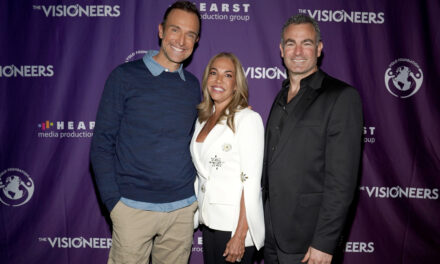James Simon, born in 1966 in Westchester, NY, is a prominent theater producer renowned for his influential work on Broadway and Off-Broadway stages, as well as his notable contributions to the UK theater scene. An alumnus of Emerson College, Boston, where he earned a Bachelor of Science in 1988, James’s early fascination with radio and storytelling shaped his unique narrative approach in theater production.
Transitioning from an aspiring actor to a powerhouse producer, James has been instrumental in revitalizing the theater landscape with productions that blend traditional appeal with innovative storytelling. His credits include acclaimed productions such as the Tony-nominated “Bells Are Ringing” and the chilling “The Woman In Black.” Currently, he is steering the Broadway-bound “Operation Mincemeat” and has played a pivotal role in the revival of “Death Of A Salesman.”
Apart from his professional pursuits, James Simon is an avid skier and seasoned traveler, constantly drawing inspiration from diverse cultures and landscapes. His dedication extends beyond the stage as he mentors emerging talents through his involvement with Untitled Theater Company 61 and Theater Resources Unlimited. James Simon continues to shape the theatrical world, championing both classic and contemporary productions that challenge and enchant audiences globally.
What initially drew you into the world of theater, and how has that initial spark evolved over your career?
My journey into theater began with a childhood fascination for storytelling and performance. I was constantly surrounded by music and theater, which undoubtedly planted the seed. This initial spark has evolved from simply enjoying the art to understanding and appreciating the intricacies of what it takes to bring a story to life on stage. My role now involves channeling that passion into creating experiences that resonate deeply with audiences.
Can you describe a moment or production that was particularly transformative for your professional life?
A pivotal moment for me was the production of “The Woman In Black.” It was one of the first times I took a major risk on a production that was quite different in tone and style from what was popular at the time. Its success was not only gratifying but also transformative, affirming my belief in trusting one’s instincts and the power of storytelling.
How do you approach the challenge of keeping theater relevant in the digital age?
Keeping theater relevant today means making it accessible and engaging for a generation that consumes content in vastly different ways than before. We incorporate technology not just in our marketing strategies but also integrate it into our storytelling methods. Whether through augmented reality or social media interaction, we’re constantly looking for ways to bridge the traditional with the modern.
What has been the most unexpected challenge you’ve faced in your career, and how did you handle it?
The most unexpected challenge came with the sudden impact of the COVID-19 pandemic. It wasn’t just about postponing productions; it was a fundamental shift in how we think about live theater. We adapted by exploring virtual performances and other forms of digital engagement, which was uncharted territory for us but ultimately very rewarding.
As a producer, how do you balance artistic integrity with commercial viability?
Balancing artistic integrity with commercial viability is one of the most complex aspects of being a producer. It starts with choosing projects that, at their core, have a strong, compelling narrative. From there, it’s about assembling a team that shares the vision and can bring it to life in a way that’s both true to the art and appealing to the audience. We must be clever and creative in our marketing strategies to ensure these stories reach the right audiences and resonate with them deeply.
Could you tell us about a time when a project did not go as planned and how you navigated that setback?
One particular project comes to mind where the lead actor had to drop out just weeks before the opening due to a health issue. It was a scramble to find a replacement who could deliver the same caliber of performance and had chemistry with the existing cast. We managed by pulling in favors, conducting emergency auditions, and having an incredibly supportive team who worked extra hours to integrate the new actor. It was stressful, but it reinforced the importance of flexibility and resilience in this industry.
What role do you think modern theater plays in society today?
Modern theater has a unique role in prompting viewers to reflect on their lives and the world around them. It’s a mirror and sometimes a window, offering perspectives that might be overlooked or underrepresented. In today’s divided society, theater can be a unifying force, providing common ground and fostering empathy among audiences from different backgrounds.
Who in the industry today do you admire the most and why?
I greatly admire Lin-Manuel Miranda for his innovation and impact on modern theater. His work in “Hamilton” not only revolutionized musical theater but also made it immensely relevant and accessible to a broader, younger audience. His ability to blend history with contemporary music and themes is nothing short of genius.
Looking ahead, what new projects are you most excited about and why?
I’m currently developing a musical that explores the themes of climate change and environmental responsibility. It’s exciting because it combines my passion for theater with my concern for the planet. We’re collaborating with environmental scientists to ensure the narrative is not only engaging but also educationally impactful, which I believe is crucial for art in today’s world.
What advice would you give to someone just starting out in theater production today?
To those just starting out, I’d say immerse yourself fully. Learn not just about your specific interest area, whether it’s directing, producing, or designing, but also about every other aspect of the theater. Understanding the broader landscape will make you more versatile and insightful, which is invaluable in this industry. And never underestimate the power of networking—this business is as much about who you know as what you know.




